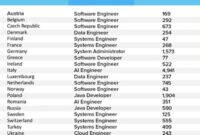Stable tech sectors job seekers * – Stable tech sectors job seekers, are you looking for a career path that offers stability and growth potential? The tech industry is known for its rapid changes, but certain sectors remain resilient, even during economic downturns. These sectors, often driven by essential services and long-term trends, offer a solid foundation for a fulfilling career.
This blog post will explore the characteristics of stable tech sectors, examine the job market dynamics, and guide you through the process of finding success in these areas. We’ll delve into the skills and knowledge you need, the best job search strategies, and the future trends shaping these sectors.
Understanding Stable Tech Sectors
In the dynamic and often unpredictable tech landscape, certain sectors exhibit remarkable resilience and stability, offering a haven for job seekers seeking secure and rewarding careers. These stable tech sectors are characterized by consistent demand, robust growth, and a less volatile nature compared to other segments of the industry.
Identifying Stable Tech Sectors
Understanding the characteristics of stable tech sectors is crucial for job seekers navigating the tech industry. These sectors typically possess the following attributes:
- High and Consistent Demand:Stable tech sectors cater to fundamental needs that remain in demand regardless of economic fluctuations. These needs can be related to essential infrastructure, core business functions, or critical societal services.
- Essential Infrastructure and Services:These sectors often provide critical infrastructure and services that underpin modern society and businesses. They play a vital role in enabling communication, data storage, financial transactions, and other essential functions.
- Technological Advancements and Innovation:While stable tech sectors may not experience the same rapid innovation cycles as other tech segments, they continuously evolve and adapt to technological advancements. This ongoing innovation ensures their relevance and long-term viability.
- Mature Market and Established Players:Stable tech sectors are often characterized by mature markets with established players. This maturity fosters stability and predictability, reducing the risk associated with rapid market shifts and disruptive technologies.
Examples of Stable Tech Sectors
Several tech sectors have consistently demonstrated stability and resilience throughout economic cycles. Here are some prominent examples:
- Cybersecurity:The increasing reliance on digital systems and the growing threat of cyberattacks have fueled a consistent demand for cybersecurity professionals. This sector offers a wide range of roles, from network security engineers to ethical hackers, ensuring a steady job market.
- Cloud Computing:Cloud computing has become an essential infrastructure for businesses of all sizes. The adoption of cloud services continues to grow, driving demand for professionals with expertise in cloud architecture, security, and management.
- Data Science and Analytics:Organizations are increasingly leveraging data to make informed decisions and gain a competitive edge. This has led to a surge in demand for data scientists, analysts, and engineers who can extract insights from vast datasets.
- Software Development:Software development remains a fundamental pillar of the tech industry. The ongoing demand for software applications across various sectors, coupled with the increasing complexity of software development, ensures a stable job market for skilled software developers.
- Healthcare Technology:The healthcare industry is undergoing a digital transformation, driven by advancements in medical devices, telemedicine, and data analytics. This trend has created a growing demand for professionals with expertise in healthcare technology.
Job Market Dynamics in Stable Tech Sectors

The job market for stable tech sectors is currently experiencing a period of sustained growth, driven by increasing demand for reliable and essential technological solutions. This trend is expected to continue in the coming years, creating a range of opportunities for skilled professionals.
Growth Projections and Anticipated Demand
Stable tech sectors, including cybersecurity, data analytics, cloud computing, and software development, are expected to witness significant growth in the coming years. This growth is fueled by several factors, including the increasing adoption of digital technologies across industries, the rising need for data security and privacy, and the continued evolution of cloud-based solutions.
- Cybersecurity:The demand for cybersecurity professionals is projected to increase significantly, as organizations face growing threats from cyberattacks and data breaches. According to Cybersecurity Ventures, the global cybersecurity workforce shortage is expected to reach 3.5 million by 2025.
- Data Analytics:The exponential growth of data generation is driving a surge in demand for data analysts and scientists. These professionals are needed to extract insights from vast amounts of data, helping organizations make better decisions and improve efficiency.
- Cloud Computing:Cloud adoption continues to accelerate, leading to a high demand for cloud engineers, architects, and developers. These professionals are responsible for designing, implementing, and managing cloud-based solutions.
- Software Development:The demand for skilled software developers remains strong, particularly in areas such as enterprise resource planning (ERP), customer relationship management (CRM), and e-commerce platforms.
Key Skills and Qualifications
Employers in stable tech sectors seek candidates with a strong foundation in technical skills and a proven ability to adapt to evolving technologies. Some of the key skills and qualifications sought by employers include:
- Technical Proficiency:Candidates should possess a strong understanding of relevant programming languages, databases, operating systems, and cloud platforms. Specific skills will vary depending on the specific role and industry.
- Problem-Solving Abilities:Stable tech sectors often require professionals who can analyze complex problems, identify solutions, and implement them effectively.
- Communication Skills:Effective communication is crucial for collaborating with colleagues, clients, and stakeholders. Candidates should be able to articulate technical concepts clearly and concisely.
- Continuous Learning:The technology landscape is constantly evolving, so candidates should be eager to learn new skills and stay updated with the latest advancements.
Comparison with Volatile Tech Areas
The job market dynamics in stable tech sectors differ significantly from those in more volatile tech areas, such as artificial intelligence (AI), blockchain, and virtual reality (VR). While volatile tech areas offer exciting opportunities for innovation and high growth potential, they also tend to be more susceptible to market fluctuations and rapid technological advancements.
- Job Security:Stable tech sectors typically offer greater job security compared to volatile tech areas, as the demand for their services remains consistent and often increases over time.
- Career Growth:While volatile tech areas may offer faster career growth opportunities, stable tech sectors provide a more predictable and sustainable career path with a wider range of roles and responsibilities.
- Skills Demand:The skills required in stable tech sectors tend to be more foundational and widely applicable, while volatile tech areas often require specialized skills and knowledge that may become obsolete quickly.
Skills and Knowledge for Success: Stable Tech Sectors Job Seekers *
Landing a job in a stable tech sector requires a unique blend of technical proficiency and soft skills. Employers seek individuals who can not only perform technical tasks but also collaborate effectively, adapt to change, and continuously learn.
Obtain a comprehensive document about the application of climate tech built world investment report that is effective.
Technical Skills
Technical skills are the foundation of success in any tech role. Employers prioritize individuals who possess a strong understanding of relevant technologies and demonstrate proficiency in applying those technologies to solve real-world problems.
- Programming Languages:Proficiency in languages like Python, Java, C++, JavaScript, and SQL is highly sought after in stable tech sectors. These languages are versatile and can be applied to a wide range of tasks, from developing web applications to analyzing data.
- Cloud Computing:Expertise in cloud platforms like AWS, Azure, and GCP is essential. These platforms enable businesses to scale their operations, improve efficiency, and reduce costs.
- Data Science and Analytics:Skills in data analysis, statistical modeling, and machine learning are becoming increasingly valuable. As businesses rely more heavily on data-driven decision making, professionals who can extract insights from data are highly sought after.
- Cybersecurity:With the growing threat of cyberattacks, professionals with expertise in cybersecurity are in high demand. This includes skills in network security, penetration testing, and incident response.
- DevOps:DevOps practices streamline software development and deployment processes. Professionals with DevOps skills are skilled in automation, continuous integration, and continuous delivery (CI/CD).
Soft Skills
While technical skills are crucial, soft skills are equally important for success in stable tech sectors. These skills enable professionals to collaborate effectively, communicate ideas clearly, and build strong relationships.
- Communication:Effective communication is essential for collaborating with colleagues, presenting ideas to stakeholders, and documenting technical solutions.
- Problem-Solving:Tech professionals must be able to identify and solve complex problems. Critical thinking, analytical skills, and a systematic approach to problem-solving are essential.
- Teamwork:Many tech projects require collaboration across teams. Strong teamwork skills, including the ability to work effectively with diverse personalities and contribute to a positive team environment, are highly valued.
- Adaptability:The tech industry is constantly evolving. Professionals need to be adaptable and willing to learn new technologies and approaches. This includes embracing change and being open to new ideas.
Continuous Learning and Professional Development
The tech industry is in a state of constant evolution. To stay competitive, professionals must engage in continuous learning and professional development. This includes:
- Online Courses and Certifications:Platforms like Coursera, Udemy, and edX offer a wide range of courses and certifications that can enhance technical skills and industry knowledge.
- Professional Conferences and Workshops:Attending industry events provides opportunities to network with peers, learn about emerging technologies, and stay abreast of industry trends.
- Mentorship and Coaching:Seeking guidance from experienced professionals can accelerate learning and provide valuable insights into industry practices and career paths.
Finding Job Opportunities
Landing a job in a stable tech sector requires a strategic approach. While these industries offer long-term career prospects, the competition for positions can be fierce. Therefore, it’s essential to have a well-defined plan and execute it effectively.
Leveraging Online Job Boards
Online job boards are a valuable resource for finding open positions in stable tech sectors. These platforms aggregate listings from various companies, allowing you to search by s, location, and industry.
- Popular Online Job Boards:Some of the most popular online job boards for tech roles include Indeed, LinkedIn, Glassdoor, Dice, and Monster. Each platform has its strengths and weaknesses, so it’s advisable to explore multiple options to maximize your reach.
- Targeted Search:When using online job boards, it’s crucial to refine your search using relevant s and filters. For example, if you’re seeking a software engineer position in cybersecurity, use s like “cybersecurity,” “software engineer,” and “developer.” This will help you narrow down your search and identify the most relevant opportunities.
- Job Alerts:Most online job boards offer email alerts that notify you of new job postings that match your criteria. This can save you time and ensure you don’t miss out on any promising opportunities.
Networking
Networking is essential for finding job opportunities in any industry, especially in stable tech sectors. Building relationships with professionals in your field can open doors to hidden job openings and provide valuable insights into the industry.
- Attend Industry Events:Industry conferences, meetups, and workshops are excellent opportunities to connect with professionals in your field. These events often feature career fairs, where you can network with recruiters and learn about open positions.
- Connect on LinkedIn:LinkedIn is a powerful platform for professional networking. Connect with people in your field, join relevant groups, and participate in discussions to expand your network.
- Reach Out to Contacts:Don’t be afraid to reach out to people in your network, even if you haven’t spoken to them in a while. Let them know you’re looking for a job and ask if they have any leads or advice.
Tailoring Resumes and Cover Letters
Your resume and cover letter are your first impression on potential employers. It’s crucial to tailor these documents to each specific job application to highlight your relevant skills and experience.
- s:Use s from the job description in your resume and cover letter to demonstrate your understanding of the position’s requirements. This helps your application stand out to applicant tracking systems (ATS), which are often used by companies to screen resumes.
- Company Culture:Research the company’s culture and values before crafting your resume and cover letter. Align your language and experiences with the company’s mission and values to demonstrate your fit.
- Quantifiable Results:Use quantifiable metrics to showcase your accomplishments. For example, instead of saying “increased sales,” state “increased sales by 15% in one quarter.” This demonstrates your impact and makes your resume more compelling.
Preparing for Interviews
Once you’ve secured an interview, it’s crucial to prepare thoroughly to showcase your skills and experience.
- Research the Company:Before the interview, research the company’s history, products, services, and recent news. This will demonstrate your genuine interest and allow you to ask informed questions during the interview.
- Practice STAR Method:The STAR method is a structured way to answer behavioral interview questions. This method involves describing the Situation, Task, Action, and Result of a specific experience. Practice answering common interview questions using the STAR method to ensure your responses are clear, concise, and impactful.
- Prepare Questions:Asking insightful questions during an interview shows your engagement and interest in the role. Prepare a few questions about the company, the team, and the position to ask during the interview.
Future Trends and Considerations
The technology landscape is constantly evolving, and stable tech sectors are not immune to this change. Understanding emerging trends and their impact on the job market is crucial for job seekers to stay ahead of the curve and secure future opportunities.
Impact of Emerging Technologies
The rapid advancements in artificial intelligence (AI), machine learning (ML), cloud computing, and big data analytics are transforming the way businesses operate and interact with their customers. These technologies are driving automation, enhancing efficiency, and creating new opportunities for innovation.
- AI and ML:These technologies are automating tasks, improving decision-making processes, and creating new applications in various sectors. For example, AI-powered chatbots are revolutionizing customer service, and ML algorithms are being used to detect fraud and predict customer behavior.
- Cloud Computing:The shift towards cloud-based infrastructure is enabling businesses to scale their operations, reduce costs, and access advanced technologies. This trend is creating a demand for cloud engineers, architects, and security professionals.
- Big Data Analytics:The increasing volume and complexity of data are driving the need for data scientists, analysts, and engineers who can extract valuable insights from this information. This trend is particularly relevant in industries like finance, healthcare, and e-commerce.
Job Market Dynamics in the Future
These technological advancements are shaping the job market in several ways. Some jobs are being automated, while others are being created. The demand for skills related to emerging technologies is increasing, and employers are seeking individuals with the ability to adapt and learn new technologies quickly.
- Increased Demand for Tech Skills:The demand for professionals with expertise in AI, ML, cloud computing, cybersecurity, and data analytics is expected to continue to grow in the coming years.
- Shift Towards Specialized Roles:As technology becomes more sophisticated, there is a growing need for specialized roles within stable tech sectors. For example, instead of a general “software developer,” companies may seek specialists in areas like AI development or cloud security.
- Importance of Soft Skills:While technical skills are essential, soft skills like communication, problem-solving, and collaboration are becoming increasingly important. These skills are crucial for navigating complex projects, working effectively in teams, and adapting to changing industry demands.
Adapting to Changing Industry Demands, Stable tech sectors job seekers *
To stay ahead of the curve, job seekers need to continuously update their skills and knowledge. This involves staying informed about emerging technologies, pursuing relevant certifications, and actively engaging in professional development opportunities.
- Lifelong Learning:The pace of technological change is accelerating, so continuous learning is essential for success. This can involve taking online courses, attending conferences, or participating in workshops.
- Developing a Growth Mindset:A growth mindset is crucial for adapting to change and embracing new challenges. This involves being open to learning new skills, seeking feedback, and constantly striving for improvement.
- Networking and Building Relationships:Networking is essential for staying informed about industry trends, identifying potential job opportunities, and building a support network. This can involve attending industry events, joining professional organizations, and connecting with people on LinkedIn.





